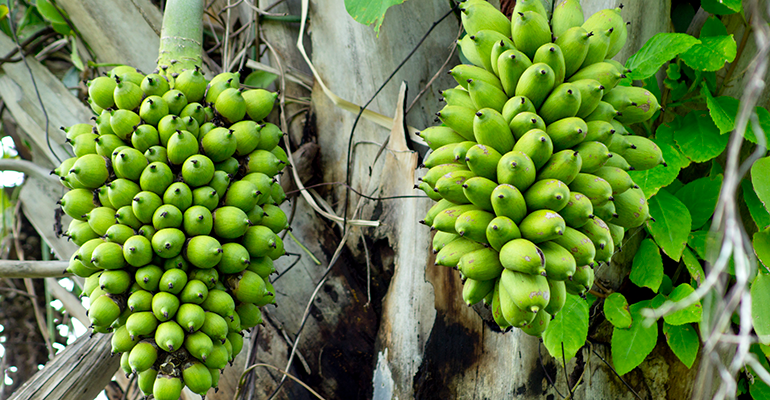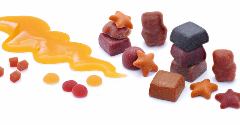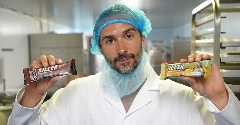News
Macauba oil emerges as potential rainforest-friendly palm oil alternative
1 Mar 2024Producers and researchers consider the rainforest-friendly credentials of Macauba palm oil and whether its sustainability credentials offer an opportunity to replace palm oil.
“It is crucial to ensure that all fats or oils utilised in household and food products are sourced sustainably and that deforestation and human rights policies are upheld,” Amanda Hurowitz, Senior Director of Asia at Mighty Earth, told Ingredients Network.

Macauba is an oil-bearing palm native to tropical and subtropical Americas. Macauba palm is suitable for intercropping and agroforestry systems, providing between 2.5 to 5 tonnes of oil per hectare per year. Researchers have described Macauba as a promising tropical palm for producing vegetable oil.
“This palm has the advantage of growing in drier biomes with less fertile soils, such as the Savannah-like Cerrados of Central Brazil, resulting in lower risks of tropical rainforest clearance,” Karin Agulla from the Fraunhofer Institute for Process Engineering and Packaging told Ingredients Network.
Macauba palm production potential
Each Macauba tree usually produces four fruit bunches per year containing up to 600 drupaceous fruits consisting of an outer husk, an oil- and fibre-rich pulp, an inner hull and a kernel. Both the pulp and the kernel contain oil that has different compositions. The pulp oil is rich in carotenoids and has a high oleic acid content, thus having a composition similar to olive oil.
The first scientific studies on Macauba pulp oil showed the absence of acute and subacute toxicity, high bioavailability of carotenoids, anti-inflammatory properties, neuroprotective effects, and the potential to increase high-density lipoprotein (HDL), often described as good cholesterol, Agulla says. “Those studies were performed with animals; therefore, this evidence should be further proved for human consumption.”
The kernel oil is rich in saturated fatty acids (SAFA) and medium-chain saturated fatty acid (MUFA), valuable sources for pharmaceutical and cosmetic use. “Scientific studies have shown that Macauba kernel oil has a potential hypoglycemic effect, with a reduction of blood glucose levels in type 2 diabetic rats,” Agulla says.
Rainforest-friendly alternative to palm oil?
“After decades of decline in deforestation, there’s been a small but worrying uptick in palm oil expansion in Indonesia, the world’s biggest exporter of palm oil,” Hurowitz says. “There is enough previously degraded land in the world to not have to tear down any more forests to expand agriculture.”
Macauba oil productivity is higher than that of major oil crops such as sunflower, peanuts, and soybeans. Its current productivity is slightly lower than that of African palm oil. “However, agronomists estimate that Macauba oil productivity can be increased by up to five tonnes of oil per year, thus potentially exceeding the productivity of palm oil,” Agulla adds.
Different from palm oil, Macauba palm is adapted to subtropical and dried regions, therefore requiring less water. “The palms naturally occur in regions outside the rainforest, reducing the risk of rainforest clearance and deforestation.”
In addition, Macauba can also be used in sustainable agriculture integrated into crops and cattle by increasing crop productivity and restoring degraded lands, which could be used to grow food crop production in the future.
“Another interesting sustainability aspect of Macauba fruits is the utilisation of the side streams from oil extraction,” Agulla says. Macauba is a versatile raw material that renders two types of oils: oil from the pulp and oil from the kernels.
After oil extraction, both side streams are rich in valuable nutrients. For instance, the pulp residue is rich in dietary fibres, whereas the residue from the kernel is rich in valuable plant proteins. “Therefore, both side streams have a high potential for producing food ingredients,” says Agulla.
“As Macauba oils, particularly pulp oil, have different application-relevant properties, they cannot be used as a one-to-one replacer for palm oil in many products,” Agulla says. “However, they can provide a sustainable and economically viable source of vegetable oil to meet the steadily growing global demand.”
“As our world warms, we need to be investing more in climate-resilient crops and perhaps Macauba, which studies show requires less water and is resistant to drought,” Hurowitz says.
Nutritional, functional and sensory properties
Macauba pulp’s dietary fibres have exciting properties for increasing viscosity, producing gels, emulsifying and foaming. With neutral sensory properties and bright colours, soluble and insoluble dietary fibres can improve the stability and texture of a wide range of food products.
The proteins from the macabre kernel have a good nutritional profile, rich in sulphur-rich amino acids like methionine and cysteine. Those amino acids are often limited in legume seeds like soybeans, so Macauba proteins can complement the nutritional profile of products based on pulse proteins.
The neutral sensory profile, bright colour, and good gelling properties make Macauba kernel proteins suitable for developing plant-based applications. The protein ingredients can be provided as protein flours, concentrates, or isolates, thus having a wide range of applications.
“Altogether, Macauba has the potential to join economic growth and sustainable development, showing a high level of circularity and the potential to bring new innovations to the market,” Agulla says.
Related news

How younger consumers are redefining ingredient choices and rejecting brand loyalty
18 Nov 2025
Gen Z and millennial consumers’ preferences for transparency, functionality, and purpose are “redefining the very nature of consumption itself”, says SPINS.
Read more
Hybrid formats and flexible positioning to disrupt category norms in 2026
17 Nov 2025
Trend forecasters expect food and drink to move more fluidly across occasions, functions, and formats as consumers seek versatility, novelty, and convenience.
Read more
Empowering innovation in fortification and colouration
13 Nov 2025
Divi’s Nutraceuticals offers a large portfolio of innovative, high-quality ingredients for foods, beverages, and supplements, with bespoke solutions and expert support for product success.
Read more
From fruit to functional solutions: Meet Paradise Fruits at Fi Europe in Paris
13 Nov 2025
Paradise Fruits Solutions and Paradise Fruits Health will showcase their combined expertise in delivering innovative, fruit-based solutions to the food and beverage industry at the upcoming Fi Europe trade show (2-4 December 2025, Paris).
Read more
New UPF standard hoped to offer consumers ‘coherence and clarity’
10 Nov 2025
Ingredients companies are being urged to enter “a new era of partnership and innovation” following the launch of the industry’s first non-UPF verification scheme.
Read more
Cottage cheese makes a comeback as consumers call for cleaner labels
6 Nov 2025
From ice cream to dips and ready meals, cottage cheese is experiencing a renaissance as a high-protein, clean ingredient for health-conscious consumers.
Read more
Ingredient quantities mislabelled on popular protein bars, independent tests show
5 Nov 2025
Some popular protein bars contain more fat, carbs, and/or sugars than claimed on their labels, independent nutrition testing reveals.
Read more
Does promoting protein content push up plant-based sales?
27 Oct 2025
Promoting the protein content of meat-free products is a more effective sales strategy than adding carbon labels, a study of UK bakery chain Greggs suggests.
Read more
Agrigum Redefined FIBER
27 Oct 2025
Agrigum has transformed gum acacia into a natural, science-backed fibre that supports gut health, sustainability, and innovation across global food and nutrition applications.
Read more
Will Wicks’ Killer Bar harm the protein bar category?
23 Oct 2025
Joe Wicks’ deliberately dangerous protein bar is fuelling anti-UPF sentiment – but there are concerns that his messaging is misguided and could have unintended consequences.
Read more